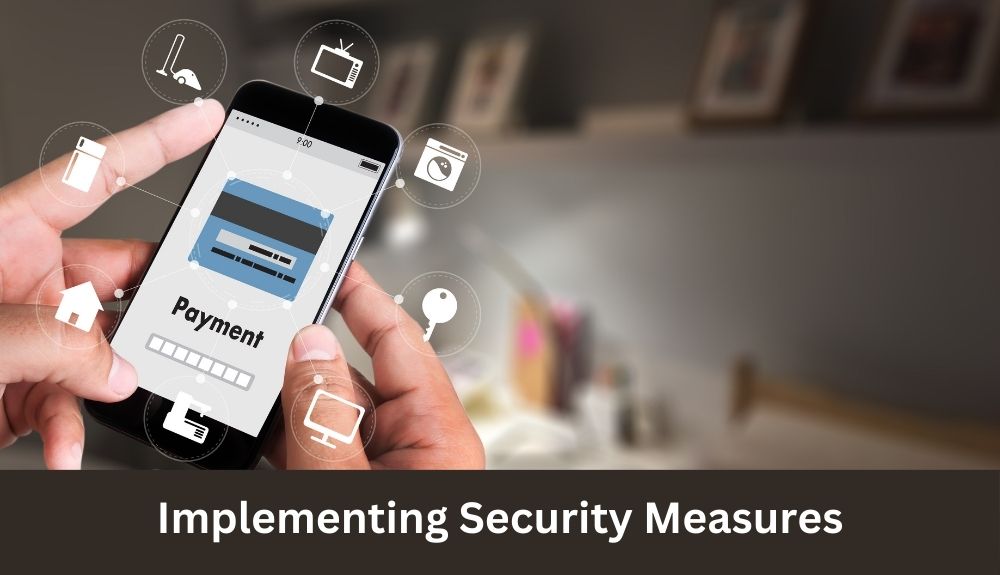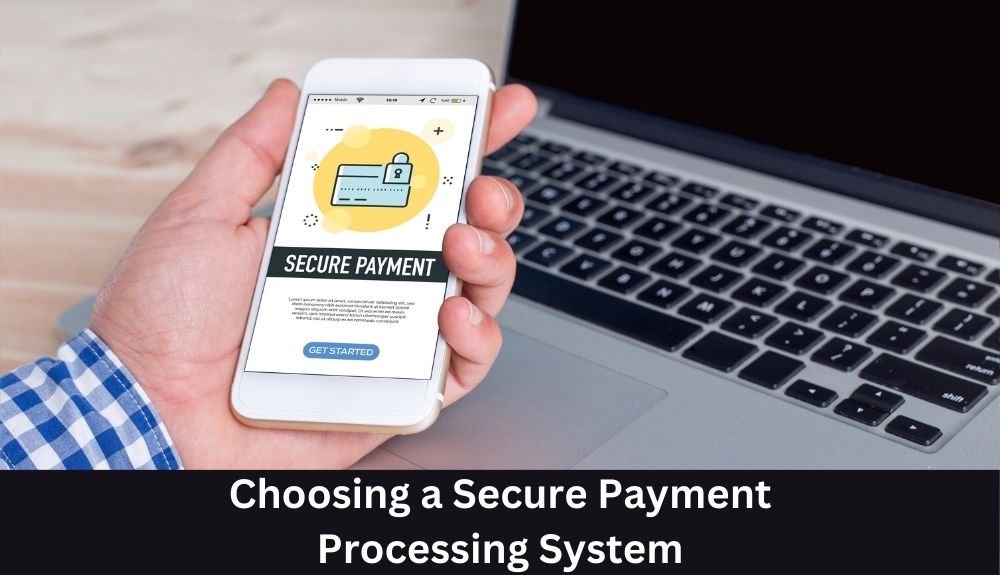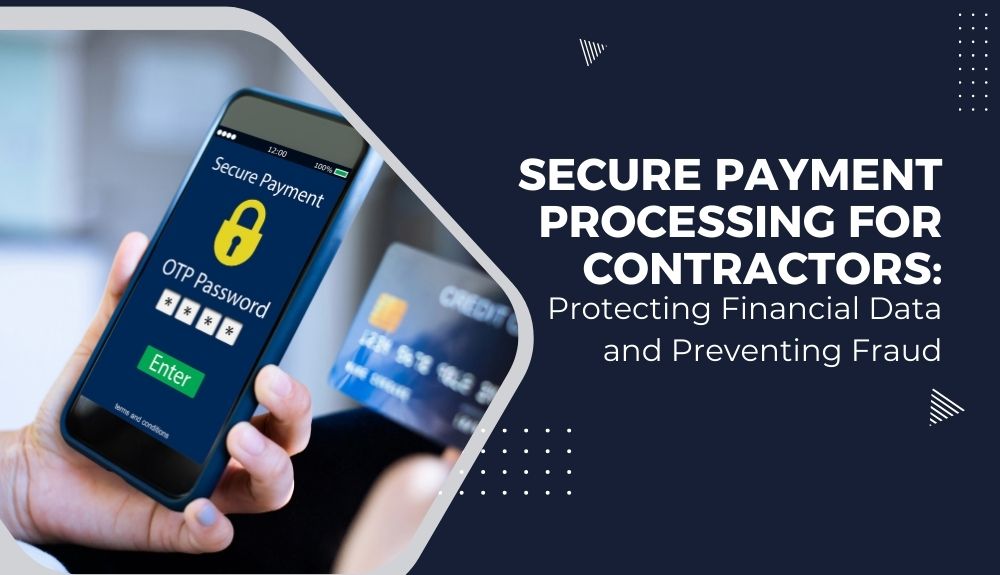Introduction to Payment Processing for Contractors
Payment processing is a crucial aspect of any business, and contractors are no exception. In the construction industry, where large sums of money change hands on a regular basis, it’s vital to ensure that financial data is protected and fraud is prevented. With cyberattacks on the rise and ever-evolving methods used by fraudsters, secure payment processing has never been more important.
In this blog post, we will explore the significance of secure payment processing for contractors and discuss effective measures to safeguard financial information. We will also delve into common types of fraud prevalent in the construction industry and provide practical tips to prevent fraudulent activities. So let’s dive in and discover how you can fortify your payment processes while maintaining peace of mind!
The Importance of Secure Payment Processing
In today’s digital age, secure payment processing is crucial for contractors. Whether you’re a small remodeling business or a large construction company, protecting your financial data and preventing fraud should be top priorities.
First and foremost, secure payment processing ensures that your clients’ sensitive information is safe from cyber threats. With the increasing number of data breaches and hacking attempts, it is essential to have robust security measures in place. By implementing encryption protocols and using trusted payment gateways, you can safeguard personal details such as credit card numbers and bank account information.
Moreover, secure payment processing builds trust with your clients. When customers know that their financial transactions are handled securely, they feel confident in doing business with you. This trust not only leads to repeat customers but also enhances your reputation within the industry.
Additionally, by prioritizing secure payment processing, you can avoid potential liabilities associated with fraudulent activities. Construction projects involve significant amounts of money changing hands between various parties. Without proper safeguards in place, contractors are vulnerable to scams like invoice fraud or identity theft.
To ensure the utmost security for your financial transactions:
– Regularly update your software systems to protect against known vulnerabilities.
– Implement multi-factor authentication methods for added protection.
– Train employees on how to identify phishing attempts or suspicious activity.
– Conduct regular audits of your payment processes to identify any weaknesses.
Investing in a reliable and trustworthy payment processor is vital for contractors looking to protect their financial data effectively. Look for providers that offer advanced security features like tokenization (replacing sensitive data with unique identifiers) or real-time transaction monitoring.
By taking proactive steps towards securing payments and preventing fraud, contractors can focus on what they do best – delivering quality services while maintaining peace of mind knowing that their financial transactions are protected against potential threats.
Implementing Security Measures

When it comes to payment processing for contractors, ensuring the security of financial data is paramount. Implementing robust security measures is essential to protect sensitive information and prevent fraud.
One key measure is the use of encryption technology. By encrypting data during transmission and storage, contractors can significantly reduce the risk of unauthorized access or interception. This ensures that financial information remains secure throughout the payment process.
Another important step in securing payment processing is implementing strong authentication protocols. Contractors should require multiple factors of authentication, such as passwords and biometric identification, to verify user identity and prevent unauthorized access.
Regular monitoring and auditing of payment systems are also crucial in detecting any suspicious activity or potential vulnerabilities. Contractors should have processes in place to regularly review transaction logs, conduct periodic security assessments, and address any identified weaknesses promptly.
Training employees on best practices for data security is another vital aspect of implementing effective security measures. Employees should be educated on recognizing phishing attempts, using secure passwords, and following proper procedures for handling sensitive information.
In addition to these measures, contractors should consider partnering with a trusted third-party payment processor that specializes in secure transactions within the construction industry. These processors often have advanced fraud detection mechanisms in place that can help mitigate risks effectively.
By implementing these security measures diligently, contractors can safeguard their financial data against potential threats while maintaining trust with clients and suppliers alike. Remember: protecting sensitive information not only protects your business but also safeguards your reputation as a reliable contractor.
Common Types of Fraud in the Construction Industry
Fraud is an unfortunate reality in many industries, and the construction industry is no exception. Contractors are vulnerable to various types of fraudulent activities that can have devastating financial consequences. It’s essential for contractors to be aware of these common fraud schemes and take proactive steps to protect themselves.
One prevalent type of fraud in the construction industry is billing fraud. This occurs when a contractor or subcontractor submits inflated invoices or bills for work that was never performed. The perpetrators may collude with other individuals within the organization, making it difficult to detect this type of fraud without proper checks and balances.
Another common form of fraud is bid rigging, where contractors secretly conspire to manipulate the bidding process in their favor. This often results in higher costs for projects and limited competition among bidders.
Misuse of funds is another significant concern. In some cases, contractors may divert project funds meant for specific purposes, such as materials or labor costs, for personal use or unrelated expenses. This not only jeopardizes project completion but also compromises client trust.
In addition to these types of fraud, identity theft and cybercrime pose serious threats as well. Hackers can gain access to sensitive financial data through phishing scams or by exploiting vulnerabilities in payment processing systems.
It’s crucial for contractors to implement robust internal controls and security measures to prevent these fraudulent activities from occurring. Regular monitoring and review processes should be established at every level within the organization to identify any irregularities promptly.
Contractors should also conduct thorough background checks on employees and business partners before entering into contracts or sharing sensitive information with them. By vetting individuals carefully, they can reduce the risk of collusion or insider threats.
Furthermore, adopting secure payment processing systems with advanced encryption technology can help protect against cyber attacks and unauthorized access to financial data during transactions.
By being vigilant about potential risks and taking proactive steps towards implementing rigorous security measures, contractors can significantly reduce their vulnerability to fraud in the construction industry. Protecting financial data and preventing fraudulent activities not
Tips for Preventing Fraud and Protecting Financial Data
1. Implement strong internal controls: Establish clear procedures and protocols for handling financial transactions within your contracting business. This includes having separate individuals responsible for initiating, approving, and reconciling payments to help prevent any single person from having too much control over the entire process.
2. Regularly monitor accounts: Keep a close eye on your financial accounts, including bank statements and credit card transactions. Look out for any suspicious activity or unauthorized charges that could indicate fraudulent activity.
3. Educate employees about fraud prevention: Train your employees on how to recognize common signs of fraud and emphasize the importance of reporting any suspicious behavior immediately. Encourage an open culture where everyone is vigilant about protecting financial data.
4. Use secure payment methods: Opt for secure payment processing systems that offer encryption technology to safeguard sensitive information during transmission. This adds an extra layer of protection against hackers attempting to intercept data.
5. Be cautious with online transactions: When making online payments or sharing financial information electronically, ensure you are using reputable websites with secure connections (look for “https://” in the URL) and never input sensitive data on public Wi-Fi networks.
6. Conduct regular audits: Perform periodic reviews of your financial records and processes to identify any potential vulnerabilities or gaps in security measures that could be exploited by fraudsters.
7. Stay updated on cybersecurity best practices: Keep yourself informed about the latest trends in cybersecurity threats targeting contractors specifically so you can take proactive steps to protect your business against emerging risks.
Remember, preventing fraud requires ongoing effort and vigilance from all levels of your organization – it’s not a one-time fix but rather an ongoing commitment to safeguarding your finances and reputation as a trustworthy contractor.
Choosing a Secure Payment Processing System

When it comes to the financial security of your contracting business, choosing the right payment processing system is crucial. With so many options available, it can be overwhelming to determine which one will best protect your financial data and prevent fraud.
One important factor to consider is encryption. Look for a payment processing system that uses strong encryption technology to safeguard sensitive information during transmission. This ensures that any data exchanged between you and your clients remains secure and confidential.
Another key feature to look for is tokenization. Tokenization replaces actual credit card numbers with unique tokens, preventing valuable cardholder data from being stored on your systems or within your network. In the event of a breach, this greatly reduces the risk of sensitive information falling into the wrong hands.
Additionally, consider whether the payment processor offers fraud detection tools such as real-time monitoring and alerts. These features help identify suspicious activity quickly so that you can take immediate action to protect yourself and your clients.
Integration capabilities are also essential when choosing a secure payment processing system. Ensure that it seamlessly integrates with your existing software and systems without compromising security measures.
Don’t forget about compliance with industry standards such as PCI DSS (Payment Card Industry Data Security Standard). A reputable payment processor should adhere to these standards, demonstrating their commitment to maintaining high levels of security in handling credit card transactions.
By carefully evaluating these factors and selecting a secure payment processing system tailored specifically for contractors’ needs, you can confidently protect your financial data while providing peace of mind for both you and your clients.
Conclusion
In today’s digital age, secure payment processing is essential for contractors to protect their financial data and prevent fraud. With the increasing sophistication of cybercriminals, it is crucial for contractors to implement robust security measures.
By implementing security measures such as encryption, tokenization, and multi-factor authentication, contractors can significantly reduce the risk of unauthorized access to sensitive financial information. Additionally, monitoring systems should be in place to detect any suspicious activity promptly.
Being aware of common types of fraud in the construction industry is also important. Contractors should educate themselves about these fraudulent practices and take proactive steps to prevent them from occurring.
To further protect financial data and prevent fraud, contractors can follow a few tips such as conducting thorough background checks on employees and subcontractors, regularly reviewing financial statements and transactions, using secure payment processing systems with built-in fraud detection features, and educating employees about best practices for cybersecurity.
When choosing a secure payment processing system for your contracting business, consider factors such as PCI compliance certification, reputation in the industry, ease of use for both you and your customers. Don’t forget to assess customer support options provided by each provider.
Remember that securing payment processing doesn’t just protect your business; it also builds trust with your clients. By taking proactive steps to safeguard sensitive financial information during payments processes., you are demonstrating your commitment towards protecting their interests too.
